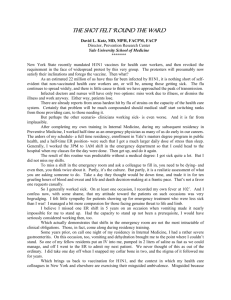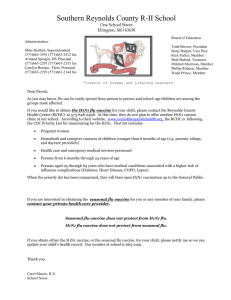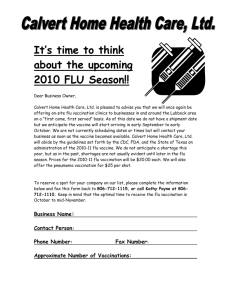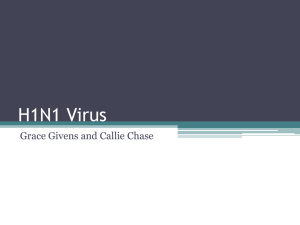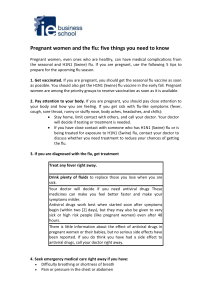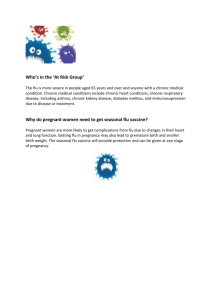H1N_Update_October_15_2009
advertisement
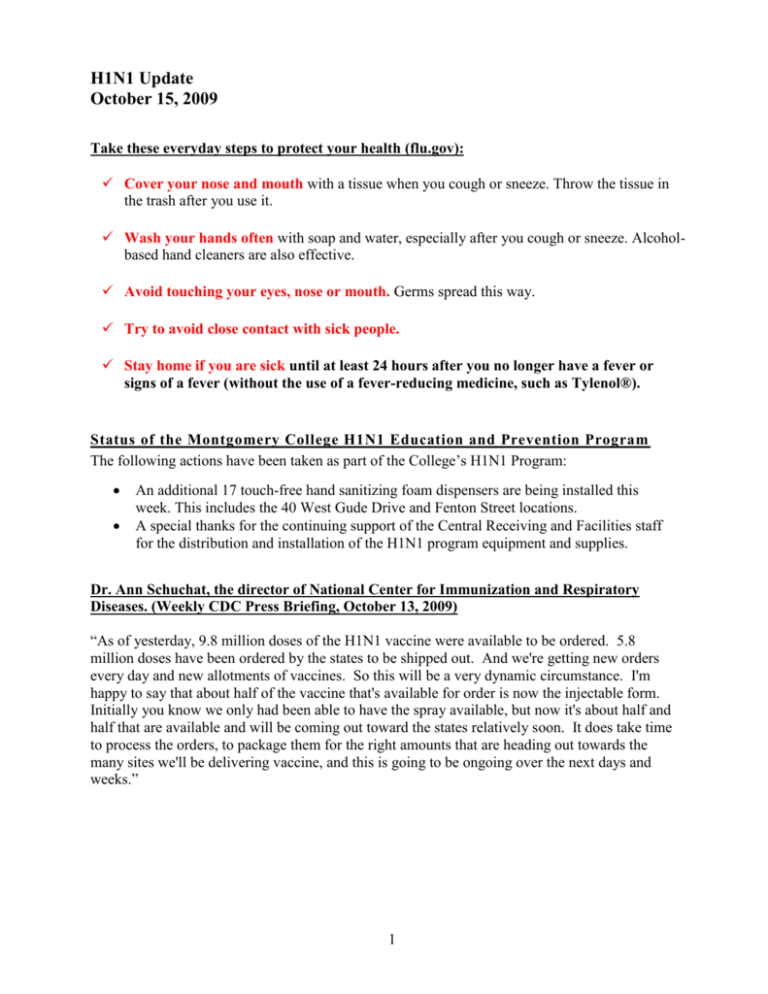
H1N1 Update October 15, 2009 Take these everyday steps to protect your health (flu.gov): Cover your nose and mouth with a tissue when you cough or sneeze. Throw the tissue in the trash after you use it. Wash your hands often with soap and water, especially after you cough or sneeze. Alcoholbased hand cleaners are also effective. Avoid touching your eyes, nose or mouth. Germs spread this way. Try to avoid close contact with sick people. Stay home if you are sick until at least 24 hours after you no longer have a fever or signs of a fever (without the use of a fever-reducing medicine, such as Tylenol®). Status of the Montgomery College H1N1 Education and Prevention Program The following actions have been taken as part of the College’s H1N1 Program: An additional 17 touch-free hand sanitizing foam dispensers are being installed this week. This includes the 40 West Gude Drive and Fenton Street locations. A special thanks for the continuing support of the Central Receiving and Facilities staff for the distribution and installation of the H1N1 program equipment and supplies. Dr. Ann Schuchat, the director of National Center for Immunization and Respiratory Diseases. (Weekly CDC Press Briefing, October 13, 2009) “As of yesterday, 9.8 million doses of the H1N1 vaccine were available to be ordered. 5.8 million doses have been ordered by the states to be shipped out. And we're getting new orders every day and new allotments of vaccines. So this will be a very dynamic circumstance. I'm happy to say that about half of the vaccine that's available for order is now the injectable form. Initially you know we only had been able to have the spray available, but now it's about half and half that are available and will be coming out toward the states relatively soon. It does take time to process the orders, to package them for the right amounts that are heading out towards the many sites we'll be delivering vaccine, and this is going to be ongoing over the next days and weeks.” 1 Montgomery County H1N1 Information Updated 10/13/09 (montgomerycountymd.gov) The H1N1 virus is considered widespread in the community at this time. Montgomery County’s Health and Human Services has received doses of intranasal H1N1 vaccine (nasal spray) and injectable H1N1 flu vaccine (flu shots). Consent forms must be filled out at the clinic but sample consent forms (English/Spanish) are available here. FREE H1N1 vaccination clinics (providing nasal spray and injectable) will be held on: Wednesday, October 21 9 a.m. to noon Piccard Drive Health Center 1335 Piccard Drive, Rockville These clinics will be focused on the following priority groups: Pregnant women Children and young adults from ages six months to 24 years Household contacts and caretakers of infants younger than six months of age Health care workers Adults ages 25 to 64 years with chronic health conditions such as asthma, heart disease, cancer and HIV Beginning later this month, FREE H1N1 vaccination clinics (providing nasal spray and injectable) will be held for all children and young adults, including public and private school students, ages six months to 24 years, on the following dates at the three locations listed below: Wednesday, October 28 from 4 to 8 p.m. Wednesday, November 4 from 4 to 8 p.m. Wednesday, November 11 from 4 to 8 p.m. Wednesday, November 18 from 4 to 8 p.m. Northwood High School 919 University Boulevard West, Silver Spring Northwest High School 13501 Richter Farm Road, Germantown Rockville High School 2100 Baltimore Road, Rockville Health officials recommend that everyone consider receiving an H1N1 vaccination. Clinics for the general public will be held at a later date. Dates and locations for those clinics will be posted when information is available. In addition to local health departments, retail locations and some private physicians will be receiving the H1N1 vaccine, as well. Montgomery County’s flu hotline -- 240-777-4200-- is open Monday through Friday from 9 a.m. to 5 p.m. 2 County Health Officials Provide Guidance on H1N1 Vaccinations (montgomerycountymd.gov) To help clarify information on the H1N1 vaccine, Montgomery County health officials remind residents that there are restrictions on when seasonal flu vaccinations and H1N1 vaccinations can be administered: • If the seasonal vaccination was administered via FluMist, there is a 28 day waiting period before H1N1 nasal spray may be administered. However, there is NO waiting period if: • Seasonal flu mist was administered and H1N1 vaccine is injected. • Seasonal flu vaccine was injected and H1N1 nasal spray is administered. • Seasonal flu vaccine was injected and H1N1 vaccine is injected. “Eventually, there will be plenty of vaccine in both nasal spray and injectable form,” explained Dr. Tillman, “but because our supply will be limited at first, we will start by vaccinating those in the high risk groups who can receive nasal spray.” The nasal spray form of the vaccine contains a live-but-weakened form of the H1N1 influenza virus. It is approved for the vaccination of healthy individuals between the ages of two and 49. However, it is not approved for use in pregnant women or school-age children with chronic illnesses. Once vaccine supplies are delivered, the County will schedule and publicize vaccination clinic dates, times and locations. Updated information can be found on the County’s H1N1 website at www.montgomerycountymd.gov/h1n1flu. The County’s flu hotline -- 240-777-4200 -- is open Monday through Friday from 9 a.m. to 5 p.m. 2009 H1N1 and Seasonal Flu: What You Should Know About Flu Antiviral Drugs (cdc.gov) What are antiviral drugs? Antiviral drugs are prescription medicines (pills, liquid or an inhaled powder) that fight against the flu in your body. While CDC recommends flu vaccine as the first and most important step in preventing flu, antiviral drugs are a second line of defense against the flu. Antiviral drugs are not sold over-the-counter and are different from antibiotics. You can only get them if you have a prescription from your doctor or health care provider. What antiviral drugs are recommended this flu season? There are two antiviral drugs recommended by CDC this season. The brand names for these are Tamiflu® and Relenza® (The generic names for these drugs are oseltamivir and zanamivir). Tamiflu® is available as a pill or liquid and Relenza® is a powder that is inhaled. 3 Who should take antiviral drugs? It’s very important that antiviral drugs be used early to treat flu in people who are very sick (for example, people who are in the hospital) and people who are sick with flu and have a greater chance of getting serious flu complications (see box below). Other people may also be treated with antiviral drugs by their doctor this season. Most healthy people with flu, however, do not need to be treated with antiviral drugs. What are the benefits of antiviral drugs? When used for treatment, these drugs can make you feel better and shorten the time you are sick by 1 or 2 days. They can also prevent serious flu complications. When should antiviral drugs be taken for treatment? Studies have shown that flu antiviral drugs work best for treatment if they are started within 2 days of getting sick. There may still be benefit in treating people with antiviral drugs even after two days have gone by, especially if the sick person has a greater change of serious flu complications (see box) or if the person has certain symptoms (such as shortness of breath, chest pain/pressure, dizziness, or confusion) or is in the hospital because of the flu. How long should antiviral drugs be taken? To treat flu, Tamiflu® and Relenza® are usually taken for 5 days, although people hospitalized with flu may need the medicine for longer than 5 days. Can children take antiviral drugs? Yes. Children can take antiviral drugs. Right now, Tamiflu® can be given to children of all ages, including children younger than one year of age. It can come in liquid for children or in capsules. Relenza® is approved for use in children 7 years of age and older, but only for people without breathing problems (such as asthma) or heart disease. It is an inhaled powder that comes in a disk inhaler. Can pregnant women take antiviral drugs? Yes. At this time, there are no studies suggesting harm to a pregnant woman or her unborn baby if she takes antiviral medicine. The flu can cause severe illness and even death in pregnant women. Taking antiviral medicine can help prevent these complications. At this time, Tamiflu® is the best medicine to treat pregnant women who have 2009 H1N1 flu. What are the side effects of antiviral drugs? Side effects differ for each antiviral drug. Tamiflu® has been in use since 1999. The most common side effects are nausea or vomiting which usually happen in the first 2 days of treatment. Taking Tamiflu® with food can reduce the chance of getting these side effects. Relenza® has been in use since 1999. The most common side effects are dizziness, sinusitis, runny or stuffy nose, cough, diarrhea, nausea, or headache. Relenza® may also cause wheezing and trouble breathing in people with lung disease. 4 Confusion and abnormal behavior leading to injury has been observed rarely in people with the flu, mostly children, who were treated with Tamiflu® or Relenza®. Flu can also cause these behaviors. But persons taking these drugs should be closely monitored for signs of unusual behavior or problems thinking clearly. This behavior should be immediately reported to a health care provider. If an antiviral drug has been prescribed for you, ask your doctor to explain how to use the drug and any possible side effects. People who have a greater chance of serious flu complications can include: Children younger than 2 years old* Adults 65 years and older Pregnant women and women up to 2 weeks from end of pregnancy People with certain chronic medical conditions (such as asthma, heart failure, chronic lung disease) and people with a weak immune system (such as diabetes, HIV) People younger than 19 years of age who are receiving long-term aspirin therapy *It is also important to know that children who are 2 years though 4 years of age also have a higher rate of complications compared to older children, although the risk for these children is lower than the risk for children younger than 2 years. MCTV – H1N1 Flu: Just the Facts Montgomery College Television recently hosted a discussion among medical professionals, county government and emergency planning personnel about the H1N1 virus. The program features information about the H1N1 virus and its similarities to and differences from the seasonal flu; questions from Montgomery College students; prevention and vaccination information; and a discussion about the emergency plans that have been created to contend with any flu outbreak at Montgomery College and in Montgomery County. Participants included: • Ulder J. Tillman, MD, MPH - Montgomery County Health Officer • Judy Lichty, MPH - Regional Director of Health and Wellness for Adventist Healthcare • Duchy Trachtenberg, MSW - Montgomery County Councilmember (At-Large) • Chris Voss - Director of the Montgomery County Office of Emergency Management and Homeland Security • Robert Wirth - Montgomery College Director of Emergency Planning H1N1 Flu: Just the Facts is airing on MCTV and is now available on the internet through the college’s podcast directory http://podcast.montgomerycollege.edu/podcast.php?rcdid=246 and on the Montgomery College YouTube channel http://www.youtube.com/watch?v=TpvlXH7WFIY . 5 ESSENCE* Report (marylandfluwatch.org) Last week, a total of 43,709 people visited Maryland emergency departments that participate in ESSENCE. Of those, 2,199 (5%) visits were for flu-like illness. This proportion is an increase over the previous weeks. The Electronic Surveillance System for the Early Notification of Communitybased Epidemics (ESSENCE) is a web-based syndromic surveillance system designed for the early detection of disease outbreaks, suspicious patterns of illness, and public health emergencies. Links to Additional Information One-stop access to U.S. Government H1N1, avian and pandemic flu information http://www.flu.gov/index.html Montgomery County http://www.montgomerycountymd.gov/mcgtmpl.asp?url=/content/exec/swine_flu/index.asp Maryland Department of Health & Mental Hygiene http://www.dhmh.maryland.gov/swineflu/index.html Centers for Disease Control and Prevention - http://www.cdc.gov/swineflu/ Contact Information For more information about Montgomery College’s planning and response, please contact Bob Wirth by e-mail at robert.wirth@montgomerycollege.edu or 240-567-4308, or Steve Maloney by e-mail at stephen.maloney@montgomerycollege.edu or 240-567-4292. 6
